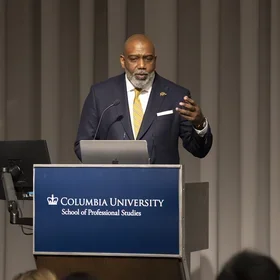Columbia University’s School of Professional Studies (SPS) welcomed Gary P. Jenkins, former New York City social services commissioner, as a speaker in its monthly Nonprofit Management Program Director’s Lunch and Learn webinar series.
The series, hosted by Dr. Basil Smikle Jr., professor of practice and director of Columbia’s M.S. in Nonprofit Management program, features prominent nonprofit leaders who share career insights with students, faculty, and alumni regarding navigating the nonprofit landscape. Jenkins is one of many special guests featured in the fall series.
Jenkins grew up benefiting from welfare and public assistance. He drew on that background to discuss the importance of “purpose” and “mission” in nonprofit work, an integral aspect of the Nonprofit Management program. With a career including roles as a “house parent” with the Administration for Children’s Services and an eligibility specialist with the Department of Social Services, Jenkins shared his journey of working with both nonprofits and government agencies to best serve vulnerable communities in New York City.
After his time at the Department of Social Services, Jenkins worked briefly as a consultant for NYC nonprofits and is now the chief administrative officer of Urban Pathways, a thriving human services organization that provides housing and other services to over 2,400 individuals annually.
Jenkins has worked with grants and requests for proposals as both a consultant for nonprofits and on the other side of the table in a government institution. He believes in working together towards a goal and clear, genuine communication between nonprofits and the city.
“It was important to me to always wake up in the morning with a purpose and with a mission,” Jenkins said, ”The Department of Social Services gave me that, so I woke up every morning excited to go into the office and help New Yorkers in need.”
Dr. Smikle raised insightful questions regarding how nonprofits should navigate the world of grantmaking and RFPs, illuminating the value of knowing one’s capacities. He delved deeper into Jenkins’s experiences, the grant writing process, and the importance of communication.
“If you don’t have the appropriate infrastructure, ask yourself, ‘Can I deliver?’” said Jenkins. “You can have a great response to the grant, you can have someone write it up really well, but if you can’t deliver on the services you promised when you reacted to that grant or RFP, you are going to fail.”
Dr. Smikle asked about the qualities of a successful nonprofit, and Jenkins responded by highlighting the importance of having a clear purpose for how services will be delivered—the nitty gritty of creating a nonprofit. He emphasized that as the former social services commissioner, he had to know what nonprofits needed to know how he could help.
“It sounds like there’s a really strong need for a marketing function and a political function. There’s a government relations piece, and there’s a communication piece that gets to be really critical to the work,” Dr. Smikle said.
For more illuminating discussions with leaders in the nonprofit space, check out the Nonprofit Management program’s upcoming events.
About the Program
Columbia University’s M.S. in Nonprofit Management program prepares graduates for leadership roles within mission-driven organizations in a wide variety of contexts, including global and community nonprofits, foundations, education, health care, and the arts, or as fundraising and development experts.
The fall 2025 application priority deadline for the M.S. in Nonprofit Management program is February 15. The final deadline is June 1. Learn more about the program here.


